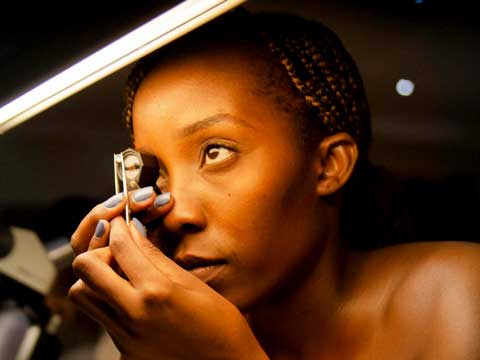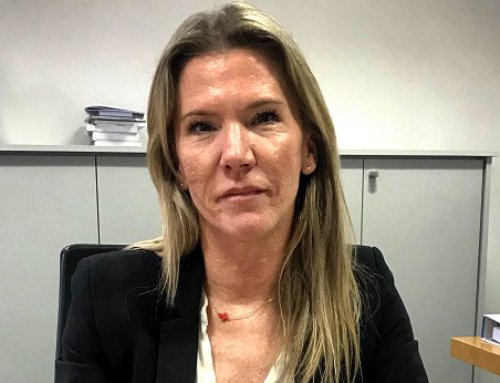Image: HB Antwerp
Diamond company HB Antwerp will open a branch in the South African country of Botswana at the end of December. It plans to create 485 jobs there in the next few years. “Thanks to our cooperation, the Botswana government’s revenue from diamonds has increased by almost 40% over the last two years,” says Margaux Donckier, communications director of HB Antwerp.
More than 40 per cent of the market value of all goods and services produced in Botswana comes from diamonds. That revenue allows Botswanans to enjoy free healthcare and free education, including at university, among other things. And yet the Botswana government’s revenues could be much higher, because most jobs in the industry, such as cutting and valuing a diamond, are done in distant foreign countries.
“Many of my compatriots have never even seen a rough diamond up close,” says Botswana’s Prince Chidzala (25) in fluent English. “I had to fly 19 hours to Belgium to see with my own eyes what such a stone looks like.”
Countering rigging in the industry
Prince, along with 14 compatriots, is in Antwerp for three months because he was recruited by HB Antwerp and is now receiving training here. HB Antwerp polishes diamonds in Antwerp, analyses them and uses technology to turn them into a kind of ‘passport’. That ‘passport’ states, among other things, which mine a diamond comes from, when it was mined and where it has been. Such transparency makes tampering in the industry almost impossible.
HB Antwerp, for example, cuts all diamonds of at least 10.8 carats that come from the Karowe mine in Botswana. The diamonds from that mine fly directly from Botswana to Belgium, so no money gets stuck in the pockets of middlemen, such as diamond dealers.
“This is revolutionary in our sector,” says Margaux Donckier. “Because we make the chain so short, the Botswana government’s revenue from diamonds has increased by 35-40% in two years.”
Duplicating the company in Botswana
HB Antwerp now wants to go one big step further. “We are going to copy our business from Antwerp in Botswana,” says Margaux Donckier. “We want to employ 485 people there by 2026. Any laser, any grinding robot, any other device from Antwerp will also be in our facility in Gaborone, the capital of Botswana. So we will employ people there who cut diamonds on site, analyse them and, for example, determine the number of carats. We want to fill those jobs with Botswanans, so that residents can finally enjoy the natural resources of their country.”
New future
Prince Chidzala is one of HB Antwerp’s first Botswana employees. During his training in Antwerp, he will receive a Belgian wage for three months. In Botswana, he will receive a wage that will be 35% above the average in Botswana. “I am very happy that I can participate in the transformation of my country,” says Prince. “For example, I am learning here how to get the best model out of a diamond.”
His compatriot Stella Moreba (25) is equally enthusiastic. “I saw a small polished and glittering diamond through a microscope for the first time here in Antwerp,” says Stella. “That was a beautiful moment. My family is very happy that I can help build a new future for our country.”
There is much need for change. “Despite the higher quality of our education, it is not abnormal to be unemployed for 10 years after graduation in Botswana,” says Natasha Majuta. “As it is, there are few jobs. And for almost every job, you need a lot of experience. That’s why I’m so happy to be able to work in the diamond industry thanks to HB Antwerp.”
Lithium and copper
In the coming years, HB Antwerp aims to replicate its business model in other non-corrupt countries as well as going broader than just diamonds. “We can also apply our principle to other raw materials, such as lithium and copper,” says Margaux Donckier. “The Botswana government would then be able to find out, for example, which electric cars use Botswana lithium, allowing it to get much more revenue from that substance.”
HB Antwerp’s heavy investment in Botswana does not mean the company is going to wind down its operations in Antwerp. Quite the contrary, in fact. “We now employ 140 people in Antwerp. That will be 355 by 2026,” says Margaux Donckier. “That’s because with our transparent approach we are creating a whole new market and therefore bringing in a lot of extra orders. We create hundreds of jobs by having a strong anti-corruption policy.”
Diamond specialist: ‘This is pretty impressive‘
HB Antwerp may well praise itself. But is their business model in the global diamond sector really that unique? “Yes,” says Koen Vandenbempt, independent diamond expert at the University of Antwerp. “Foreign companies do often put Botswanans to work sorting diamonds, for example, but the fact that HB Antwerp is also going to cut and value diamonds in Botswana on a large scale and thus create several jobs for highly skilled people is revolutionary. This will allow the company to really move Botswana forward. If this plan succeeds, it will be pretty impressive.“







